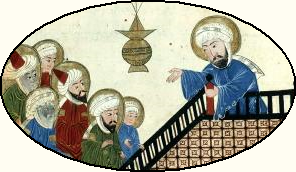Spadina Literary Review — edition 11 page 20
.../
There can’t be a more psychological event than being alone in a cave and getting visited by the angel Gabriel. This was how the Qur’an was sent down to Mohammed, in a series of visitations from Gabriel, Allah's messenger, over a twenty-year span.
Again, merely because someone is conditioned by human-level factors doesn’t mean he is not divinely ordained, for you can contend that such conditions as being an orphan and being a poor cousin to the Meccan ruling clan were created by Allah in order to set Mohammed up to be the prophet Allah wanted him to be. Anything that happens, you can always say it was God’s plan. The tough part is explaining why God didn’t work smarter.
Why didn’t Allah just have Gabriel speak directly to the polytheist crowd at the Ka’ba? Hard to figure. The same question comes up in other religions. If God needs us to do such-and-such, why doesn’t he write his orders in the sky for maximum viewership? Or why didn’t he design us to do what he needs in the first place? If he’s so perfect, why does he need us to do anything at all?
You can see why the ancient clerics didn’t want questions.

Mohammed exhorts companions to stamp out false gods
Christendom too has had its holy wars against infidels, its inquisitions, its contradictions, its brain-twisters, its burning of heretics. Its clerics once wielded significant power over the souls of men. Those days are past. Hirsi Ali, as mentioned, takes the Protestant Reformation, launched in 1517 when Martin Luther nailed his 95 theses to a church door in Wittenberg, as a model for Islam to follow. The Reformation stood at the start of a historical process that eventually would liberate the European mind from Church dogma and would lead to the Enlightenment and to what we proudly call modernity.
Still, the Reformation was a rebellion against a discernable central institution, the Catholic Church, for which there is no equivalent in highly-decentralized Islam. Worse, the Reformation entailed a century of wars of religion in Europe: is that really what the Middle East needs?
Another awkward fact, as Hirsi Ali’s critics have noted, is that the Protestants were originally purists aiming to return to the supposedly pure scriptural basis of the Christian faith before the Church supposedly corrupted it. In that sense, Islam has already had its reformation and the results are not pretty. The Muslim Reformation can be said to have started with Muhammad ibn Abd al-Wahhab, the 18th-century preacher who, finding contemporary Islam compromised and corrupt, demanded a return to the fundamentals expressed in 7th-century scriptures. Wahhabism was, and is, famously supported by the house of Saud, which grew rich and powerful on the narrative of being protector of — what else? — the rock/shrine Ka’ba.